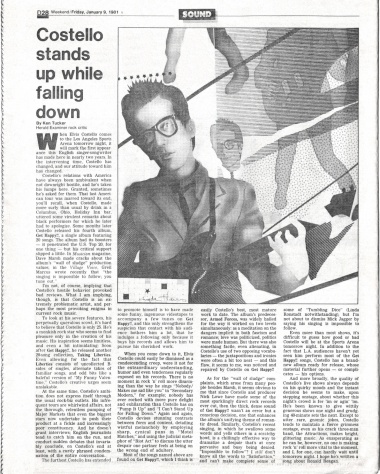Los Angeles Herald-Examiner, January 9, 1981: Difference between revisions
(start page) |
(+emphasis) |
||
| Line 26: | Line 26: | ||
Most of the songs named above are found on ''Get Happy!!'', which I think is easily Costello's best, most mature work to date. The album's predecessor, ''Armed Forces'', was widely hailed for the way it worked on two levels simultaneously: as a meditation on the dangers implicit in both fascism and romance; love was politicized, politics were made human. But there was also something facile, even alienating, in Costello's use of two opposing vocabularies — the juxtapositions and ironies were often a bit too neat — and this flaw, it seems to me, was noticed and repaired by Costello on ''Get Happy!!'' | Most of the songs named above are found on ''Get Happy!!'', which I think is easily Costello's best, most mature work to date. The album's predecessor, ''Armed Forces'', was widely hailed for the way it worked on two levels simultaneously: as a meditation on the dangers implicit in both fascism and romance; love was politicized, politics were made human. But there was also something facile, even alienating, in Costello's use of two opposing vocabularies — the juxtapositions and ironies were often a bit too neat — and this flaw, it seems to me, was noticed and repaired by Costello on ''Get Happy!!'' | ||
As for the "wall of sludge" complaints, which arose from many people besides Marsh, it seems obvious to me that since Costello and producer Nick Lowe have made some of the most sparklingly direct rock records ever cut, then the thick, dense sound of ''Get Happy!!'' wasn't an error but a conscious decision, one that enhances the album's unifying theme of romantic dread. Similarly, Costello's recent singing, in which he swallows some words and yells others in a scratchy howl, is a chillingly effective way to dramatize a despair that's at once pervasive and busy being denied. "Impossible to follow"? I still don't know all the words to "Satisfaction," and can't make complete sense of some of "Tumbling Dice" (Linda Ronstadt notwithstanding), but I'm not about to dismiss Mick Jagger by saying his singing is impossible to follow. | As for the "wall of sludge" complaints, which arose from many people besides Marsh, it seems obvious to me that since Costello and producer Nick Lowe have made some of the most sparklingly direct rock records ever cut, then the thick, dense sound of ''Get Happy!!'' wasn't an error but a conscious decision, one that enhances the album's unifying theme of romantic dread. Similarly, Costello's recent singing, in which he swallows some words and yells others in a scratchy howl, is a chillingly effective way to dramatize a despair that's at once pervasive and busy being denied. "Impossible to follow"? I ''still'' don't know all the words to "Satisfaction," and can't make complete sense of some of "Tumbling Dice" (Linda Ronstadt notwithstanding), but I'm not about to dismiss Mick Jagger by saying his singing is impossible to follow. | ||
Even more than most shows, it's difficult to guess how good or bad Costello will be at the Sports Arena tomorrow night. In addition to the fact that L.A. audiences haven't yet seen him perform most of the ''Get Happy!!'' songs, Costello has a brand-new album ready for release, whose material further opens — or complicates — his options. | Even more than most shows, it's difficult to guess how good or bad Costello will be at the Sports Arena tomorrow night. In addition to the fact that L.A. audiences haven't yet seen him perform most of the ''Get Happy!!'' songs, Costello has a brand-new album ready for release, whose material further opens — or complicates — his options. | ||
Revision as of 20:15, 29 October 2020
|
